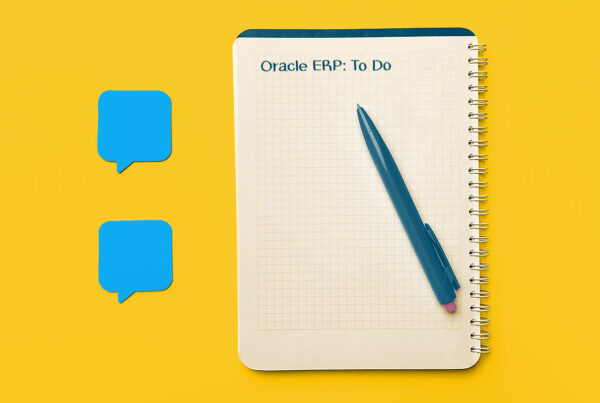Oracle EBS has been a key strategic element in the success of many companies over more than three decades. Today, many of these businesses are considering an Oracle EBS to Cloud migration, aiming to capitalize on the scalability, flexibility, and cost-efficiency that cloud environments provide. This strategic move can facilitate improved operational efficiency and innovation. Migrating to the cloud also ensure that businesses are able to rapidly adapt to market demands and technological advancements.
By migrating to the cloud, companies benefit from enhanced data security measures and disaster recovery options. They also gain the ability to access their systems from anywhere, supporting global operations and remote workforces. Ultimately, the cloud transition supports growth and sustainability, providing a more robust, agile, and cost-effective infrastructure than traditional on-premises setups.
Meeting the Moment
With all the benefits, migrating from Oracle EBS to the cloud presents a variety of technical challenges. One of the primary hurdles is ensuring data integrity and security during the migration process. The complexity of Oracle EBS — often heavily customized and integrated with other systems — makes safeguarding data a significant concern. Ensuring that sensitive information remains secure, both in transit and at rest in the cloud, requires meticulous planning and the implementation of robust encryption methods and secure data transfer protocols. Additionally, businesses face the task of maintaining compliance with various data protection regulations. These can vary significantly depending on the geographic location of the cloud servers.
Another significant challenge is minimizing disruption to business operations. Migrating large volumes of data and complex business processes to the cloud can be time-consuming. Without careful planning, it can lead to extended periods of system unavailability. Moreover, ensuring compatibility between Oracle EBS and the cloud environment is crucial. This involves addressing potential issues with performance, scalability, and the integration of cloud services with existing on-premises systems. Overcoming these technical challenges is essential for businesses to leverage the full benefits of cloud computing, such as improved scalability, flexibility, and cost savings.
Despite these challenges, migrating Oracle EBS to the cloud brings a number of benefits to the IT team. In addition to enhancing their operational efficiency, a successful cloud migration boosts the team’s strategic role within the company. Moreover, IT teams can improve their ability to support the business, positioning themselves as key drivers of innovation and growth.
Oracle EBS to Cloud Migration: Strategies & Process
As with any major IT initiative, the best practice for migrating Oracle EBS to the Cloud begins with comprehensive planning. Businesses should first establish clear objectives for the migration, including performance goals, scalability requirements, and cost objectives. This initial step involves a detailed analysis of your existing Oracle EBS environment, including customizations, integrations, and data volumes. Identifying potential challenges and how to address them is crucial — even at this early stage. It’s also important to choose the right cloud service provider that aligns with your organization’s technical and business requirements. The planning phase should culminate in a detailed migration strategy outlining your approach, timeline, required resources, and risk mitigation measures.
Following the planning phase, executing the migration involves several key steps. We recommend conducting a test migration to validate your process, identify unforeseen challenges, and ensure minimal disruption to business operations. Data migration is a critical part of this phase, demanding careful attention to data integrity, security, and compliance requirements. Businesses should leverage cloud migration and automation tools such as Oracle EBS Cloud Manager to streamline the migration process. After the migration, thorough testing is essential to confirm that all Oracle EBS components function correctly in the cloud environment. This includes performance testing, security testing, and user acceptance testing. Finally, businesses should plan for ongoing optimization and management of their cloud environment. Regular monitoring, performance tuning, and cost management practices will ensure that your organization can fully realize the benefits of migrating Oracle EBS to the cloud.
Key Technical Challenges
Migrating Oracle EBS to the cloud is a complex process that can present a variety of technical challenges. These challenges must be carefully managed to ensure a smooth transition and to fully leverage the benefits of cloud computing. Some of the most common technical challenges faced during Oracle EBS to cloud migration include:
Data Security
Ensuring data security during and after migration involves protecting sensitive information from unauthorized access, leaks, or breaches throughout the migration process and in the cloud environment.
To address data security, we often recommend implementing comprehensive encryption techniques for data at rest and in transit, utilizing strong encryption standards such as AES-256 and TLS 1.2 or higher. Establish robust key management practices, ensuring encryption keys are securely stored and managed. Additionally, adopt cloud provider security protocols, including identity and access management (IAM) controls, including multifactor authentication (MFA), to define and enforce who can access your data and under what circumstances. Conduct regular security assessments and audits to identify and remediate vulnerabilities, ensuring continuous protection of your data in the cloud.
System Downtime
Minimizing system downtime is crucial to prevent significant operational disruptions during the Oracle EBS to cloud migration process. In most cases, it’s best practice to plan for an incremental migration approach. This allows parts of Oracle EBS to be moved to the cloud without taking the entire system offline. If possible, you’ll want to utilize migration tools that support live migration or near-zero downtime technologies.
We recommend planning the migration carefully to occur during off-peak hours or scheduled maintenance windows to minimize impact. You’ll also need to conduct thorough testing in advance. This will help ensure a smooth transition and prepare fallback plans in case issues arise during the migration.
Data Migration Strategies
Safely transferring large volumes of data without loss or corruption requires careful planning and execution. You’ll want to employ robust data migration tools that provide features for secure, efficient, and reliable data transfer. We typically recommend prioritizing data cleansing to remove redundant or obsolete data before migration. Use data validation techniques before and after the migration to ensure integrity and accuracy. Also, consider chunking data into manageable segments for migration to mitigate risk and simplify the process. Finally, you should always implement comprehensive backup and recovery strategies to protect your data throughout the migration.
Integrating Cloud Services with Existing Infrastructure
Integrating cloud services with existing on-premises systems can be complex, requiring seamless interoperability without disrupting current operations. To begin, conduct an inventory of your existing integrations and assess their compatibility with your cloud services. You’ll need to plan for customizations or extensions to existing integrations to ensure seamless connectivity.
Wherever possible, leverage middleware and API management tools to facilitate communication between cloud-based Oracle EBS and existing systems. We also recommend working with your cloud service provider to understand their best practices and support services tailored to Oracle EBS integration. Testing here is crucial. Conduct thorough integration testing to identify and resolve issues before going live.
Managing Cost Implications
Unlike the capital costs associated with self-hosting, cloud services are typically priced on a pay-as-you-go basis. Customers are billed for the computing resources, storage, and services they consume, often measured on an hourly or monthly basis. This can be more cost-effective than self-hosting Oracle EBS by eliminating upfront hardware costs. It also allows businesses to scale resources based on demand, thus paying only for what you actually use.
That said, controlling costs associated with cloud operations is essential for achieving a cost-effective transition. Companies can manage ongoing, pay-as-you-go cloud costs by closely monitoring their usage and employing various cost optimization tools. We also recommend implementing best practices such as rightsizing resources, using reserved instances for predictable workloads, and shutting down unnecessary instances. Establishing governance and cost management policies, also plays a crucial role in controlling expenses. Additionally, leveraging automated scaling features ensures that resources are dynamically adjusted to meet demand, preventing overprovisioning and unnecessary spending.
Enhancing Operations and Elevating Your Impact
Addressing these technical challenges requires careful planning, as well as expertise in Oracle EBS and cloud technologies. Specialized migration tools and services can also play an important role. Any successful migration strategy must include thorough testing, security measures, and data integrity checks. Likewise, a clear plan for integration and optimization is critical to ensuring a seamless transition to the cloud.
An Oracle EBS to cloud migration is not merely a technological upgrade. It’s a strategic approach to unlocking business growth and innovation. For the business, this transition opens up a number of opportunities, from enhanced scalability to improved efficiency and cost savings.
A successful migration can also provide benefits for the IT team. By streamlining infrastructure management and enhancing scalability, a cloud migration can elevate the IT team’s standing within the company. In addition to demonstrating technical prowess, it also positions them as key contributors to the organization’s success and growth.
Top of Form
Looking to ensure your Oracle EBS cloud migration is a success? Schedule a call with a Traust solutions architect now to navigate the complexities of migration with confidence.





